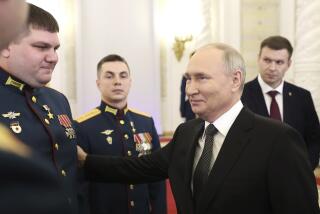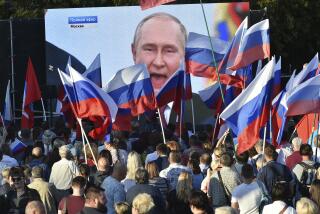A Maestro and His Machinations
- Share via
That old orchestra leader, Russian President Boris N. Yeltsin, seems to be building to one more grand finale. In this latest composition, his purpose--as before--is to try to maintain himself in power after June 2000, when he constitutionally has to step aside.
In recent months and even years, Yeltsin has been following a little-noticed policy of unification of Russia and Belarus that has seemed to be more posturing than reality.
However, just before the Dec. 19 Duma elections, the treaty of unification suddenly moved forward. The great advantage for him of a Russia-Belarus confederation is that new political institutions will be required. The confederation or federation will need a president, and Yeltsin surely has a candidate for that post in mind.
The old maestro has played such tunes before.
In 1992, he decided to dissolve the Russian Congress. Over a 10-month period he followed seemingly separate economic, constitutional and foreign policies that, in retrospect, proved to be skillfully interconnected and orchestrated to achieve the dissolution of the Congress in September 1993 while maintaining international support and economic aid.
In 1993, Yeltsin imposed a constitution stipulating that legislative elections be held six months before presidential elections. He used the 1993 and 1995 Duma elections to weaken or discredit opponents, and he held on to power himself. The 1999 election has a similar purpose.
The most significant event in the just-completed Duma election clearly is the strong vote achieved by the Unity Party of Prime Minister Vladimir V. Putin. Many Westerners are calling Unity a centrist party, but this is misleading. It has no real policies except support of the war in Chechnya.
Yeltsin surely initiated that war--and has conducted it ferociously--in order to distract attention from economic failures and consolidate nationalist feelings behind the government in last weekend’s election.
If no Russian election were to be held for four years, we could relax. The war in Chechnya would no doubt wind down, and Russian politicians could return to economic issues. If the West stopped bribing them to follow the old, failed policies of the International Monetary Fund, Russian politicians might be driven to an industrial policy that would actually work.
Alas, a presidential election is scheduled in six months. The war in Chechnya will not be a plus for the government if it drags on. Yet, at the same time, a victory before the presidential election will not unite people behind a party headed by a colorless candidate, Putin, with no program other than the war.
The main lesson of the Duma’s election is that nationalist appeals work, and Putin will need some other nationalist appeal in June 2000.
It is often assumed that Yeltsin is too sick to cling to power. Yet Yeltsin has seemingly been on death’s door since 1991--the year I was told that he was dying of cancer. Since then, he has had regular--and convenient--medical relapses whenever an awkward political crisis arises. It would be a mistake to make assumptions about Yeltsin now.
Yeltsin seems relaxed about a popular prime minister for the first time because he believes that Putin, as Russia’s president, will be subordinate to himself as head of the larger unit. (Former Serbian President Slobodan Milosevic employed the same tactic to remain in power by assuming the presidency of Yugoslavia.)
The problem is that Putin cannot win a fair presidential election, all the more so if Yeltsin is still in power and if the war in Chechnya is over.
So the question is whether the planned scenario involves an intention to intensify nationalism--anti-American rhetoric and, say, a battle over unification with Ukraine--or simply to cancel or control the presidential election. The Belarus leader has intensified his authoritarian rule; Yeltsin may try to follow his lead.
The West must strongly oppose any such policy, but Yeltsin is not likely to respond to persuasion. The West’s best option is to try to organize unity among a broad range of political forces and to even indicate that it would favor a military coup to put them in control if Yeltsin attempts to hold onto power.
We need to enter the new millennium by breaking with Yeltsin and helping Russia, including the Communists, complete the difficult process of integration into the West. This means reconciling ourselves to a Russia that does not correspond to our cliches about economic development.
More to Read
Sign up for Essential California
The most important California stories and recommendations in your inbox every morning.
You may occasionally receive promotional content from the Los Angeles Times.










